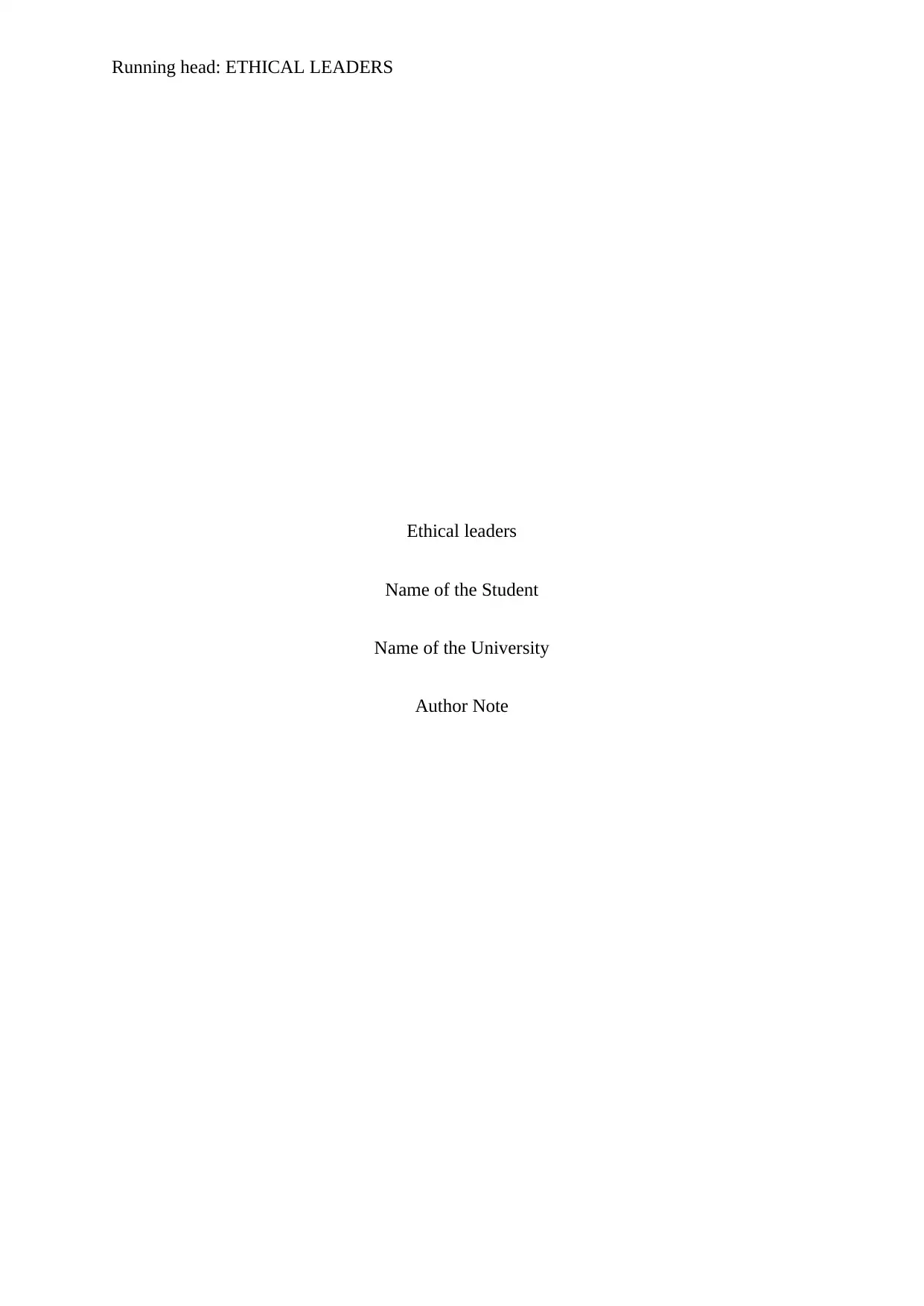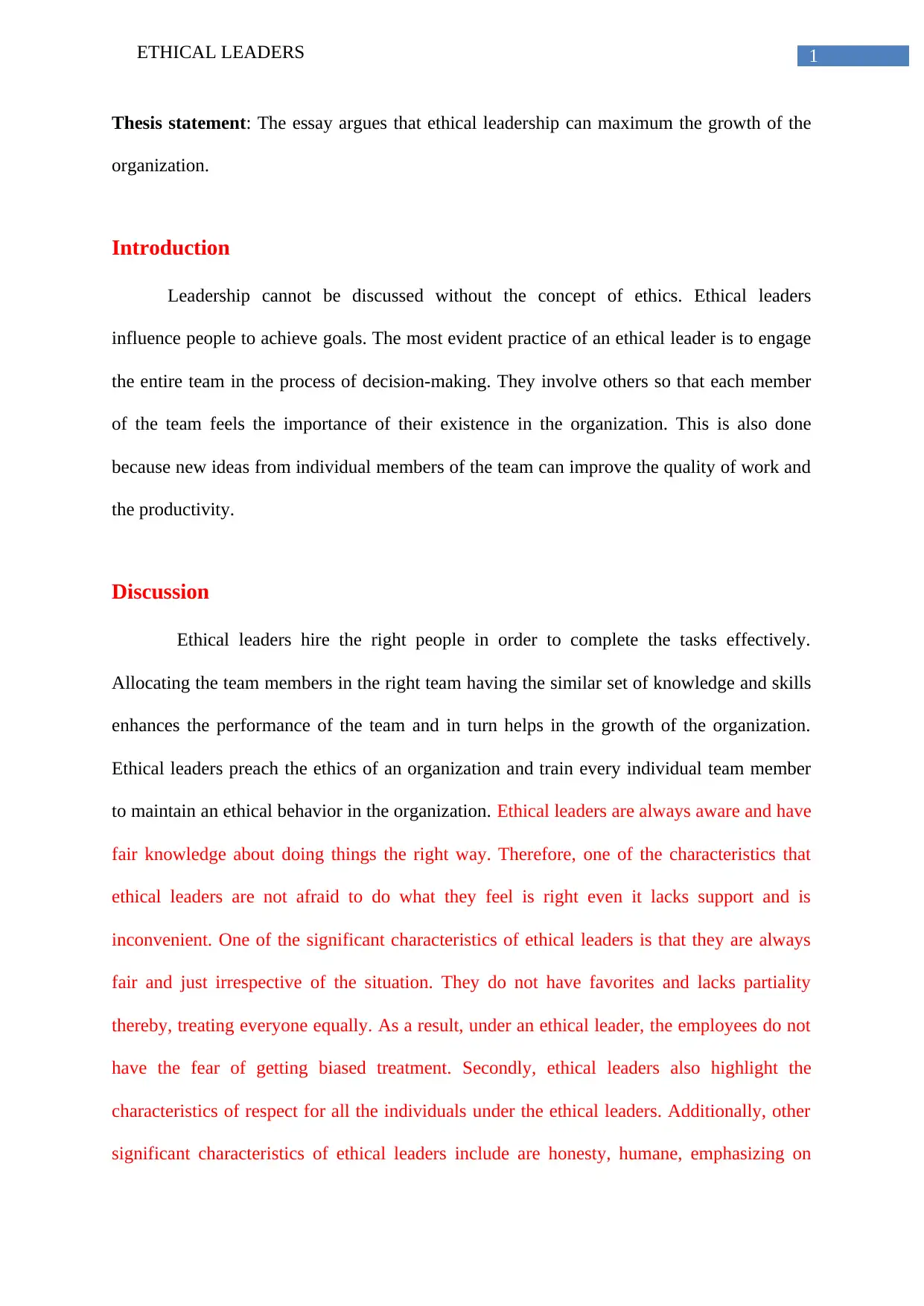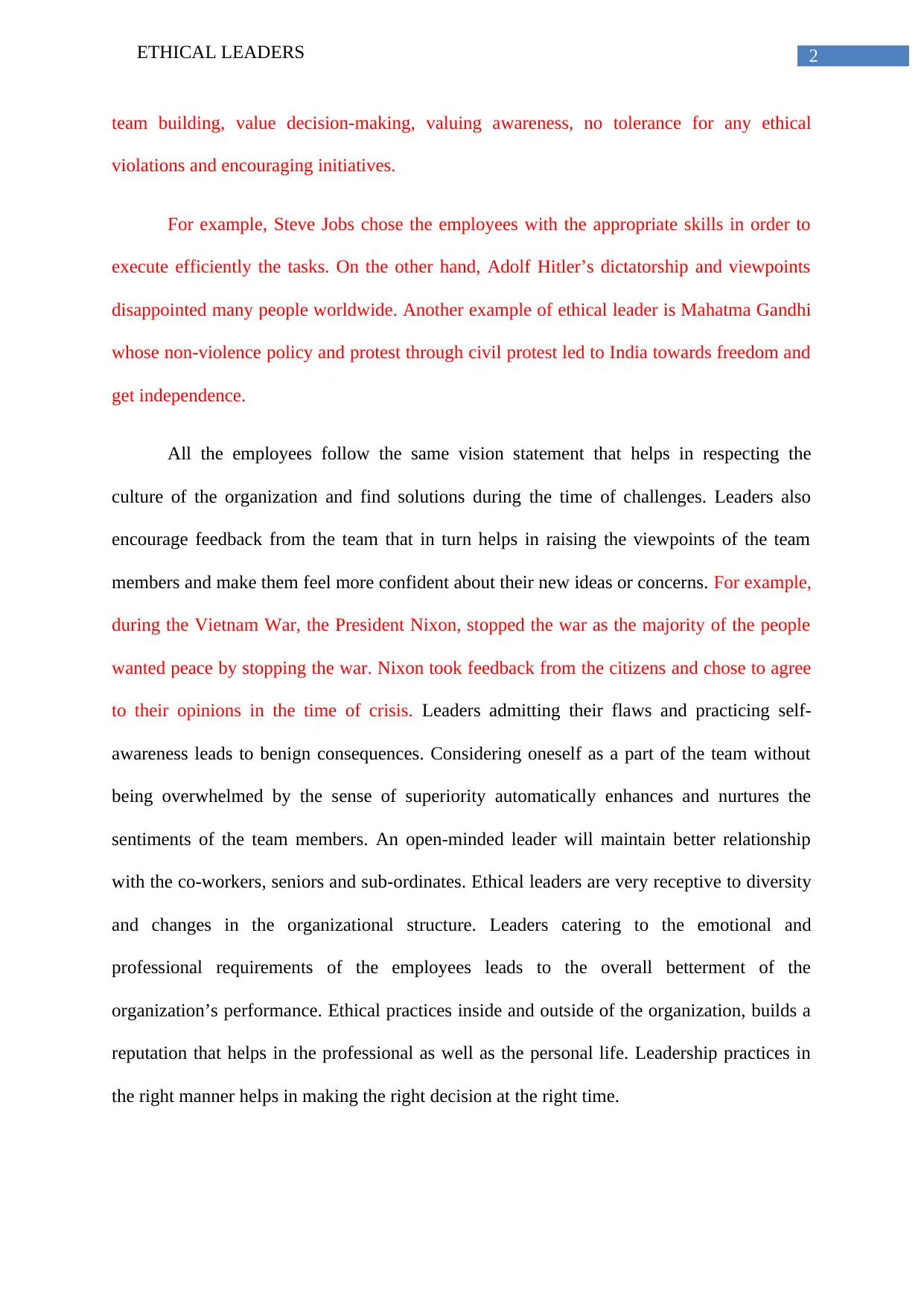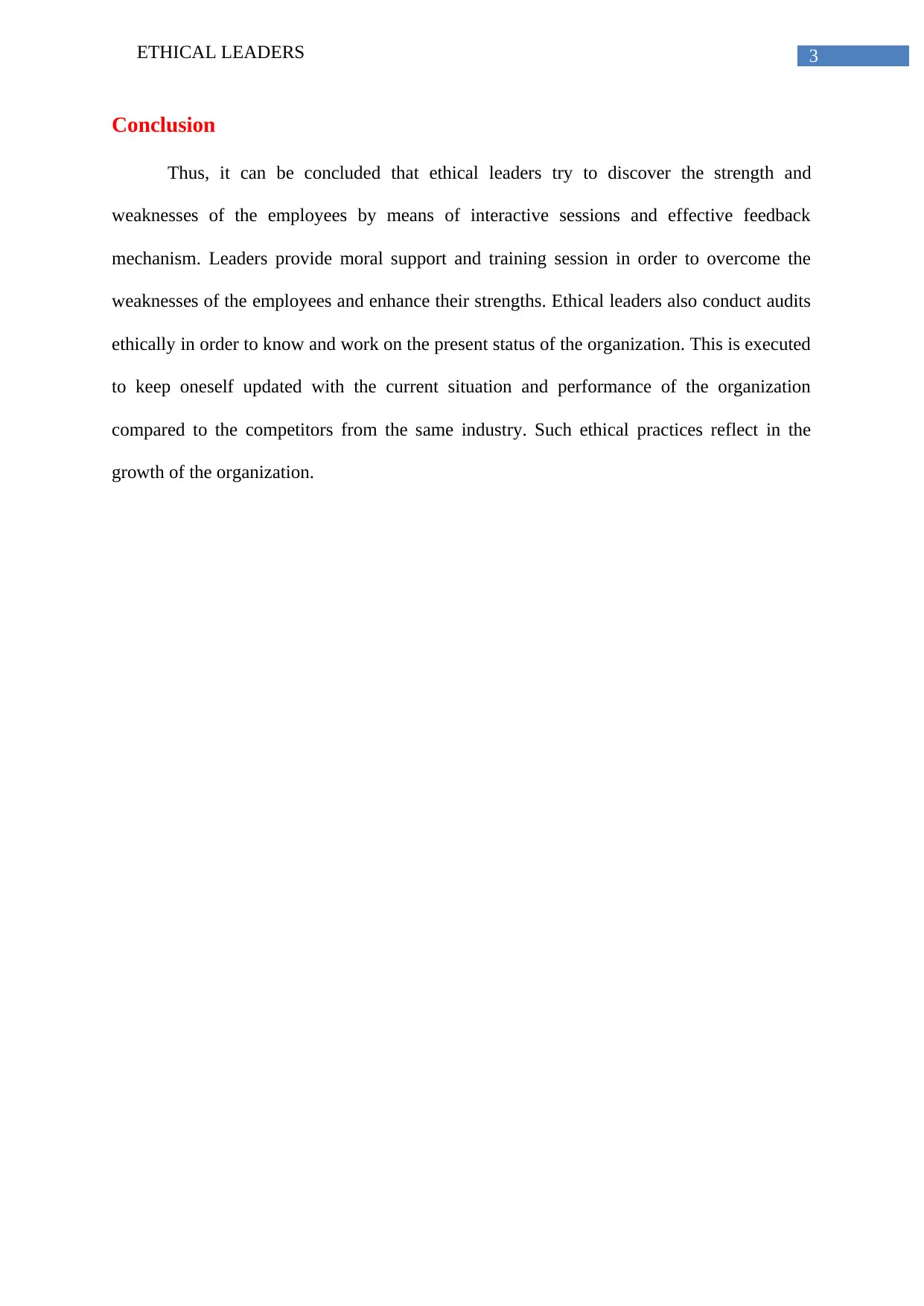BUSI 2620U: Critical Reflection on Ethical Leadership in Business
VerifiedAdded on 2022/12/26
|4
|750
|73
Essay
AI Summary
This essay, written for BUSI 2620U, provides a critical reflection on ethical leadership. It begins by establishing the importance of ethics in leadership and emphasizes the role of ethical leaders in fostering organizational growth. The essay delves into the traits of ethical leaders, highlighting their commitment to fair decision-making, employee involvement, and ethical conduct. It uses examples like Steve Jobs and Mahatma Gandhi to illustrate ethical leadership in practice. The reflection also examines the evolution of the student's understanding of ethical leadership, drawing on course material to reinforce existing views and identify key traits of an ethical leader. The essay concludes by emphasizing the importance of ethical practices in driving organizational success.

Running head: ETHICAL LEADERS
Ethical leaders
Name of the Student
Name of the University
Author Note
Ethical leaders
Name of the Student
Name of the University
Author Note
Paraphrase This Document
Need a fresh take? Get an instant paraphrase of this document with our AI Paraphraser

1ETHICAL LEADERS
Thesis statement: The essay argues that ethical leadership can maximum the growth of the
organization.
Introduction
Leadership cannot be discussed without the concept of ethics. Ethical leaders
influence people to achieve goals. The most evident practice of an ethical leader is to engage
the entire team in the process of decision-making. They involve others so that each member
of the team feels the importance of their existence in the organization. This is also done
because new ideas from individual members of the team can improve the quality of work and
the productivity.
Discussion
Ethical leaders hire the right people in order to complete the tasks effectively.
Allocating the team members in the right team having the similar set of knowledge and skills
enhances the performance of the team and in turn helps in the growth of the organization.
Ethical leaders preach the ethics of an organization and train every individual team member
to maintain an ethical behavior in the organization. Ethical leaders are always aware and have
fair knowledge about doing things the right way. Therefore, one of the characteristics that
ethical leaders are not afraid to do what they feel is right even it lacks support and is
inconvenient. One of the significant characteristics of ethical leaders is that they are always
fair and just irrespective of the situation. They do not have favorites and lacks partiality
thereby, treating everyone equally. As a result, under an ethical leader, the employees do not
have the fear of getting biased treatment. Secondly, ethical leaders also highlight the
characteristics of respect for all the individuals under the ethical leaders. Additionally, other
significant characteristics of ethical leaders include are honesty, humane, emphasizing on
Thesis statement: The essay argues that ethical leadership can maximum the growth of the
organization.
Introduction
Leadership cannot be discussed without the concept of ethics. Ethical leaders
influence people to achieve goals. The most evident practice of an ethical leader is to engage
the entire team in the process of decision-making. They involve others so that each member
of the team feels the importance of their existence in the organization. This is also done
because new ideas from individual members of the team can improve the quality of work and
the productivity.
Discussion
Ethical leaders hire the right people in order to complete the tasks effectively.
Allocating the team members in the right team having the similar set of knowledge and skills
enhances the performance of the team and in turn helps in the growth of the organization.
Ethical leaders preach the ethics of an organization and train every individual team member
to maintain an ethical behavior in the organization. Ethical leaders are always aware and have
fair knowledge about doing things the right way. Therefore, one of the characteristics that
ethical leaders are not afraid to do what they feel is right even it lacks support and is
inconvenient. One of the significant characteristics of ethical leaders is that they are always
fair and just irrespective of the situation. They do not have favorites and lacks partiality
thereby, treating everyone equally. As a result, under an ethical leader, the employees do not
have the fear of getting biased treatment. Secondly, ethical leaders also highlight the
characteristics of respect for all the individuals under the ethical leaders. Additionally, other
significant characteristics of ethical leaders include are honesty, humane, emphasizing on

2ETHICAL LEADERS
team building, value decision-making, valuing awareness, no tolerance for any ethical
violations and encouraging initiatives.
For example, Steve Jobs chose the employees with the appropriate skills in order to
execute efficiently the tasks. On the other hand, Adolf Hitler’s dictatorship and viewpoints
disappointed many people worldwide. Another example of ethical leader is Mahatma Gandhi
whose non-violence policy and protest through civil protest led to India towards freedom and
get independence.
All the employees follow the same vision statement that helps in respecting the
culture of the organization and find solutions during the time of challenges. Leaders also
encourage feedback from the team that in turn helps in raising the viewpoints of the team
members and make them feel more confident about their new ideas or concerns. For example,
during the Vietnam War, the President Nixon, stopped the war as the majority of the people
wanted peace by stopping the war. Nixon took feedback from the citizens and chose to agree
to their opinions in the time of crisis. Leaders admitting their flaws and practicing self-
awareness leads to benign consequences. Considering oneself as a part of the team without
being overwhelmed by the sense of superiority automatically enhances and nurtures the
sentiments of the team members. An open-minded leader will maintain better relationship
with the co-workers, seniors and sub-ordinates. Ethical leaders are very receptive to diversity
and changes in the organizational structure. Leaders catering to the emotional and
professional requirements of the employees leads to the overall betterment of the
organization’s performance. Ethical practices inside and outside of the organization, builds a
reputation that helps in the professional as well as the personal life. Leadership practices in
the right manner helps in making the right decision at the right time.
team building, value decision-making, valuing awareness, no tolerance for any ethical
violations and encouraging initiatives.
For example, Steve Jobs chose the employees with the appropriate skills in order to
execute efficiently the tasks. On the other hand, Adolf Hitler’s dictatorship and viewpoints
disappointed many people worldwide. Another example of ethical leader is Mahatma Gandhi
whose non-violence policy and protest through civil protest led to India towards freedom and
get independence.
All the employees follow the same vision statement that helps in respecting the
culture of the organization and find solutions during the time of challenges. Leaders also
encourage feedback from the team that in turn helps in raising the viewpoints of the team
members and make them feel more confident about their new ideas or concerns. For example,
during the Vietnam War, the President Nixon, stopped the war as the majority of the people
wanted peace by stopping the war. Nixon took feedback from the citizens and chose to agree
to their opinions in the time of crisis. Leaders admitting their flaws and practicing self-
awareness leads to benign consequences. Considering oneself as a part of the team without
being overwhelmed by the sense of superiority automatically enhances and nurtures the
sentiments of the team members. An open-minded leader will maintain better relationship
with the co-workers, seniors and sub-ordinates. Ethical leaders are very receptive to diversity
and changes in the organizational structure. Leaders catering to the emotional and
professional requirements of the employees leads to the overall betterment of the
organization’s performance. Ethical practices inside and outside of the organization, builds a
reputation that helps in the professional as well as the personal life. Leadership practices in
the right manner helps in making the right decision at the right time.
⊘ This is a preview!⊘
Do you want full access?
Subscribe today to unlock all pages.

Trusted by 1+ million students worldwide

3ETHICAL LEADERS
Conclusion
Thus, it can be concluded that ethical leaders try to discover the strength and
weaknesses of the employees by means of interactive sessions and effective feedback
mechanism. Leaders provide moral support and training session in order to overcome the
weaknesses of the employees and enhance their strengths. Ethical leaders also conduct audits
ethically in order to know and work on the present status of the organization. This is executed
to keep oneself updated with the current situation and performance of the organization
compared to the competitors from the same industry. Such ethical practices reflect in the
growth of the organization.
Conclusion
Thus, it can be concluded that ethical leaders try to discover the strength and
weaknesses of the employees by means of interactive sessions and effective feedback
mechanism. Leaders provide moral support and training session in order to overcome the
weaknesses of the employees and enhance their strengths. Ethical leaders also conduct audits
ethically in order to know and work on the present status of the organization. This is executed
to keep oneself updated with the current situation and performance of the organization
compared to the competitors from the same industry. Such ethical practices reflect in the
growth of the organization.
1 out of 4
Related Documents
Your All-in-One AI-Powered Toolkit for Academic Success.
+13062052269
info@desklib.com
Available 24*7 on WhatsApp / Email
![[object Object]](/_next/static/media/star-bottom.7253800d.svg)
Unlock your academic potential
Copyright © 2020–2025 A2Z Services. All Rights Reserved. Developed and managed by ZUCOL.





